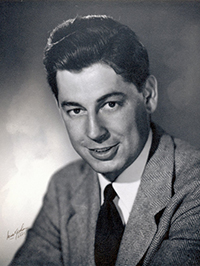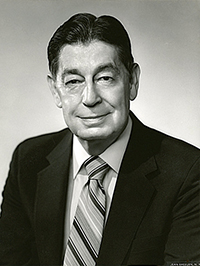In Memoriam: William A. McAdams
1918-1995
by Jim Willison, HPS History Committee


William A. McAdams, a native of Hagerstown, Maryland, was born on 24 February 1918 and died in 1995.
McAdams served on the Health Physics Society (HPS) committee that was established to study the need for certification. When the committee's recommendations were approved, the HPS appointed a temporary American Board of Health Physics (ABHP) on 8 November 1958 and appointed McAdams as the chairman.
McAdams received a bachelor of science degree, cum laude, in mathematics and physics from Washington College (1940). Other education included lecture courses in nuclear physics, reactor technology, and chemical separations processes at the University of Chicago (1943–1944); education programs in nuclear and radiation physics and nuclear safety in Oak Ridge, Tennessee, and Hanford, Washington (1944–1947, instructor 1948–1954); and special training in biological effects of radiation at the Swedish Hospital Cancer Institute and the University of Washington, in Seattle, Washington (1948, 1950, and 1952).
After graduation in 1940, McAdams joined the E.I. du Pont de Nemours and Company (DuPont) as a ballistics engineer at Penns Grove, New Jersey, and was successively senior supervisor of ballistics at DuPont’s Indiana Ordnance Works (1941–1943), research physicist on the Manhattan District Nuclear Project at the University of Chicago (1943–1944), and a research and engineering specialist in radiation protection at the Hanford Plant in Richland, Washington (1944–1946).
Mr. McAdams transferred from DuPont to the General Electric (GE) Company when GE took over the operations at Hanford, in 1946, and from 1946 to 1951 he held supervisory positions in Radiological Protection Services leading to him becoming manager of the organization from 1951 to 1955. He transferred to GE's Engineering Services in Schenectady, New York, in 1955 as a consultant, providing consulting help to the entire company on radiation protection and nuclear standards. In 1959, he was named manager-engineering standards, assuming responsibility for external standardization activities of GE and the consolidation of company positions on technical and policy matters in standardization. In 1966, he was appointed to the position of manager-industry standards, an expanded position with greater corporate policy responsibility, and he also became a member of the Executive Staff at the Corporate Headquarters in Fairfield, Connecticut.
Prior to 1959, McAdams' major field was radiation protection, in which he became a recognized expert. He was elected to the National Council on Radiation Protection and Measurements; was the first chair of the American Board of Health Physics, a board for certifying radiation protection experts; and participated in many national and international programs for establishing radiation protection and nuclear safety standards. In 1956–1957, he was one of the leaders in forming the International Organization for Standardization (ISO)/Technical Committee 85 committee on nuclear energy and headed the US technical advisory group for many years.
After 1959, his major activity was in the development and use of national and international standards and in the study of standardization systems, especially those affecting the electrical and electronics industries. In 1960, he was elected a vice president of the US National Committee of the International Electrotechnical Commission (IEC) and took the leadership in increasing US participation in IEC committees and strengthening the financial support for this work. He was elected president of the US National Committee of the IEC effective 1 January 1968 and served until the middle of 1974, when he resigned to assume leadership positions in several national organizations in the United States. He continued as a member of the US National Committee Executive Committee until the end of 1976 and then was elected an honorary life member. He continued as an advisor, writer, and spokesman on IEC and other international standards matters.
He was elected president of the IEC at its general meeting in Stockholm in June 1980. He stated that his main goals as president were to improve relations between the ISO and IEC, set priorities to maintain reasonable budget levels, and form liaisons with other international bodies to plan standardization in new technology fields.
Throughout his career, McAdams was very active in a wide range of other standards-development bodies and held high positions in many of them, including as director of the American National Standards Institute (1966–1970), director of the American National Metric Council (1975–1976), and president of the American Society for Testing and Materials (1977–1978).
He also served on senior standards boards or councils of the Electronics Industries Association, the Institute of Electrical and Electronics Engineers, the Association of Home Appliance Manufacturers, and the American National Standards Institute. He chaired or served on panels of the National Academy of Sciences and agencies of the US Government involved in standardization matters. He also presented testimony to a number of US congressional committees, commenting on proposed legislation involving standards and their applications.
He was a US delegate to approximately 60 meetings of 12 international organizations, heading the delegations at more than 20 of these.
McAdams received a number of honors and awards for his work in national and international standards. He received one of the General Electric Steuben Sculpture Awards, presented as part of the company's centennial anniversary to honor outstanding contributions to the company's success. Other honors and awards include the Standards Engineers Society Leo B. Moore Meda (1977), the American National Standards Institute Special Award for International Standards (1974), and the American National Standards Institute Standards Medal (1965).
He authored approximately 150 papers and articles on radiation physics, radiation protection laws, and codes, electrical safety, metric conversion, product certification, standardization systems, and international standards. McAdams was awarded patents on two nuclear reactor fuel testing methods and on a separations process for uranium oxide-heavy water reactors.



